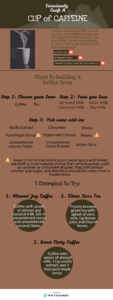What is your morning drink of choice? Do you habitually drink coffee or tea? If so, you’re not alone; statistics suggest that roughly 90% of Americans consume caffeine in one form or another on a daily basis.
Caffeine is a plant product found naturally in coffee beans, tea, cocoa and chocolate, and it is an ingredient in many soft drinks, energy drinks, and some prescription or over the counter drugs. Caffeine stimulates the central nervous system, and when consumed in moderate doses (up to 250 mg or about two 6-ounce cups of coffee per day), it can help increase alertness and reduce sleepiness.
The current Dietary Guidelines for Americans recommend limiting caffeine intake to 400 mg per day, which is about the equivalent of three to five 8-ounce cups of coffee. Under this limit, caffeine is not associated with an increased risk of major chronic disease or premature death, and moderate caffeine consumption has few, if any, side effects for most individuals. Excessive caffeine consumption, on the other hand, may disrupt sleeping patterns, contribute to feelings of anxiety and nervousness, lead to heartburn, nausea and/or diarrhea, and cause increased blood pressure, body temperature, sweating or tremors.
Since coffee and tea both contain caffeine, is one beverage better than the other? The health merits of the two have been debated for years, and it seems as though new studies are always coming out either encouraging us to drink these beverages or warning us to avoid them. The bottom line, according to nutrition professionals, is to stick to the beverage you enjoy, and make sure to enjoy it in moderation without too much added sugar or fat. MyPlate, MyWins offers the following tips for “redoing your coffee shop stop”:
-

Click on the infographic to view full screen If you typically add milk or cream to your beverage, opt for low-fat or fat-free milk whenever possible
- Forgo extras like whipped cream and caramel drizzle
- If you typically sweeten your drink or you like to order sweetened drinks, try to add less sugar or ask your barista to cut the amount of syrup they use in half. Better yet, forgo the sugar altogether and flavor your beverage with a sprinkle of cinnamon or cocoa powder.
For additional tips to build a better beverage, see the infographic to the right!

